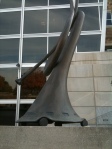Halloween evening my colleagues and I embarked on the three-hour car ride from Chicago to Indianapolis to take part in Solution Tree’s 2011 Author Speak, a three-day event featuring 99 authors in the field of education. I took away some valuable nuggets to share with my staff as we continue guiding our students towards their post-secondary opportunities.
Ten different strands in education were featured. They were:
- 21 Century Skills
- Assessment
- Instruction
- Leadership
- Literacy
- Principals
- Professional Learning Communities
- Response to Intervention
- School Improvement
- Special Populations
Being able to listen to the likes of Robert Marzano, Douglas Reeves, Rick DuFour, Anthony Muhammad under one roof for one event was outstanding. I congratulate Jeffrey Jones, President and CEO of Solution Tree, and his team for orchestrating such a world-class event.
I wanted to focus on one nugget I took away from Author Speak 2011: the connection of PLCs, Differentiated Instruction, and Common Formative Assessments.
I participated in a networking session on Response to Intervention, facilitated by Austin Buffum. We were also honored to have Mike Mattos be part of the conversation as well. Mr. Mattos made a comment on differentiated instruction at the high school level and the difficultly of it having a student load of 100-150 students on a daily basis. He keyed on several manageable aspects that we all can accomplish in our PLCs to help our students succeed.
PLC Monthly Calendar
Each PLC should create a monthly calendar. On that calendar the team should write down the dates in which the common pre assessment will be given, when the common post assessment will be given and when student results of these assessments will be analyzed in the PLC. This calendar will provide focus and direction for the PLC as they move throughout the unit of study.
Blank Day
 In addition to the above mentioned dates, a blank day should also be added. A blank day is a day during the unit of study in which the teachers would use to differentiate instruction based on the analysis of student data in the PLCs. This particular day may be used for cooperative learning, expert groups, or focused sessions with students who are not grasping the skills. During this blank day, we can also provide an opportunity for students who have shown proficiency in the skill to work on enrichment activities and enhance their proficiency of the skills.
In addition to the above mentioned dates, a blank day should also be added. A blank day is a day during the unit of study in which the teachers would use to differentiate instruction based on the analysis of student data in the PLCs. This particular day may be used for cooperative learning, expert groups, or focused sessions with students who are not grasping the skills. During this blank day, we can also provide an opportunity for students who have shown proficiency in the skill to work on enrichment activities and enhance their proficiency of the skills.
I encourage you and your PLC to plan the next unit of study around a calendar and focus on these steps:
- What skill(s) do you want your students to be proficient in?
- Create a pre and post assessment that measures those skills.
- Negotiate on when those assessments will be administered and results analyzed.
- Discuss student results and instructional strategies that worked and didn’t work.
- Negotiate on the date of the blank day to reteach and/or provide enrichment on the skills and concepts being learned.
- Celebrate student accomplishments at the end of the unit.
In Rick DuFour’s session on Raising the Bar, Closing the Achievement Gap, he
stressed that we must be masters of time, not victims of time. We have the power to make time valuable for us and our students.
Let’s focus our attention on those skills and concepts that will help our students be college and career ready.
If you attended Author Speak, we would love to know your impressions and thoughts of the conference.

November 7, 2011 at 4:37 pm
It was my honor to join your networking session. So glad you find our recommendations helpful.
Good luck!
Mike Mattos